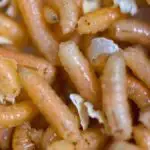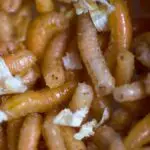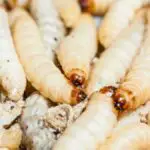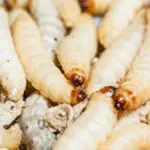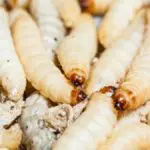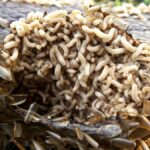Maggots are the larval stage of common flies at home. These flies include houseflies, cheese flies, and fruit flies.
Basically, maggots are unsightly, especially in the kitchen!
Female flies can lay over 100 eggs per batch, and each of these has the possibility of getting to the larval stage, which means they develop into a maggot. As flies lay their eggs near food, they are pretty common in the kitchen area, as you can imagine.
Fortunately, maggots in the kitchen can be eliminated using a few tips discussed below.
Why Do I Have Maggots on My Kitchen Floor?
Maggots are generally found on dirty, damp, messy kitchen floors. You will also find them in guilty bins full of litter, any food leftovers on the kitchen sink, or carpets that are both dusty and damp.
Anything that has the potential of inviting flies is also home to maggots. Adult flies like to lay their eggs where food is abundant so that maggots have enough to survive on for five to seven days before they morph into pupae.
Flies can lay over a hundred eggs at any one time. They will start hatching in just one day. The maggots will feed on leftover foods for about five days before they become pupas.
In a highly fly-infested area, flies can lay eggs such that there are batches of maggots in every corner of the kitchen.
How to Get Rid of Maggots on Kitchen Floor
If your kitchen is maggot-infested or keeps getting infested, here is how to eliminate maggots on the kitchen floor.
1. Clean Kitchen Surfaces before Going to Bed
Flies like to lay their eggs on damp messy surfaces full of food debris., food, or rotting animals.
Given that most eggs will hatch by morning, a day after they are laid, cleaning all the surfaces will prevent eggs that have been laid from hatching.
Some other common surfaces where you will find maggots include the countertops, sinks, and plates that have stayed for more than a day without cleaning.
Always clean and dry out these surfaces with a clean cloth to makes these surfaces unappealing to flies.
2. Kill Maggots Using Boiling Water
Hot water kills maggots instantly. It is the best method to use if you do not want to use chemicals in your kitchen.
Just pour out the water and clean up the floor of the kitchen. You can also add about one and a half cups of hydrogen peroxide to a gallon of water.
Hydrogen peroxide helps kill even eggs that might not have hatched and acts as a bleach that disinfects your kitchen surfaces so that you can use them again.
3. Use Natural Fly Repellents to Prevent Them from Laying Eggs
You use several items in the kitchen that can help repel flies and prevent them from laying eggs.
They include aromatic herbs such as bay leaf basil and lavender, vodka, and apple cider vinegar. Flies can also be eliminated using citronella and camphor smoke, lemongrass oil, witch hazel, and cloves.
Dish soap also acts as a great insecticide and fly repellent. This is because most such soaps contain small amounts of borax, which is lethal to insects.
4. Use an Electronic Fly Trap
Electronic fly zappers emit a white UV light that it uses to attract flies. When they get close, the device instantly zaps them with electricity. The flytrap not only kills flies but any other flying insects at home. It is best used in the kitchen where you do not need any flying insects.
However, avoid using it in places where you may need insects such as bees to pollinate your flowers, as it will kill all of them.
The fly zapper has low power consumption and is automatic.
5. Introduce Fly Repelling Plants
You can introduce various plants in your kitchen to get rid of flies. Some of the plants include lavender, chrysanthemum, tansy, and marigold. There is also the interesting Venus flytrap, which feeds on insects.
Plants are effective and harmless ways to get rid of insects when combined with general clean floor spaces. They will also look great in your kitchen if you have some space.
If you go with the method, place the plants near a window or door to get some natural light from the outside.
6. Cover all Foodstuffs and Litterbins
As said earlier, lay their eggs in places where larvae can get enough food to keep growing. Therefore, they may lay their eggs on top of the food that has been left uncovered for the night or any food leftovers that have been deposited in your dustbin.
It is, therefore, recommended that you cover all your food and litter before going to bed.
7. Use Chemicals to kill both Flies and Maggots
You may use various chemicals to get rid of maggots. If a part of your kitchen floor is carpeted, consider the use of boric acid. Sprinkle it all over the carpet (after you have tested it), then clean it up with a vacuum cleaner.
You can also use Permethrin to treat the maggot-infested floor.
Permethrin-based chemicals also kill other insects and bugs that might have invaded your kitchen. Insecticides are effective in getting rid of flies before they lay their eggs.
Once you have used a pesticide, clean the surface thoroughly to prevent food contamination. Then, maintain the kitchen maggot-free by regularly cleaning with bleach or a mixture of water and vinegar.
Frequently Asked Questions

Maggots live up to 8 days, but the horror doesn’t stop there!
Eventually, they will turn into flies, which is another pest that you do not really want to have in your kitchen.
Boiling water is your best bet if you want to kill maggots fast!
Eating maggots or eating anything that maggots have been in contact with has the potential of passing you a bacterial infection.
Let’s not forget the maggots are likely to have come into contact with feces or even raw meat.
Conclusion
Maggots are unsightly soft-bodied larvae that are laid by flies on your kitchen floor. You can avoid the problem by cleaning your kitchen at least once each day.
If the infestation has already occurred, consider using other methods discussed above.
Always cover your food and water whenever you use chemicals and related substances in the kitchen.

